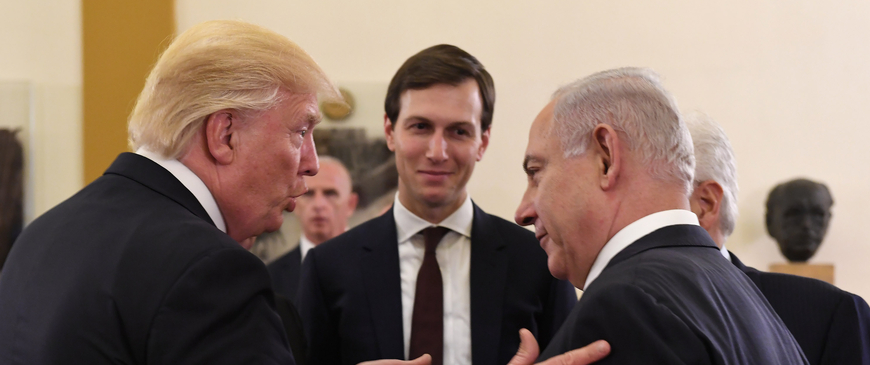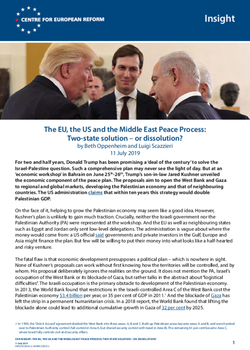
The EU, the US and the Middle East Peace Process: Two-state solution – or dissolution?
For two and half years, Donald Trump has been promising a ‘deal of the century’ to solve the Israel-Palestine question. Such a comprehensive plan may never see the light of day. But at an ‘economic workshop’ in Bahrain on June 25th-26th, Trump’s son-in-law Jared Kushner unveiled the economic component of the peace plan. The proposals aim to open the West Bank and Gaza to regional and global markets, developing the Palestinian economy and that of neighbouring countries. The US administration claims that within ten years this strategy would double Palestinian GDP.
On the face of it, helping to grow the Palestinian economy may seem like a good idea. However, Kushner’s plan is unlikely to gain much traction. Crucially, neither the Israeli government nor the Palestinian Authority (PA) were represented at the workshop. And the EU as well as neighbouring states such as Egypt and Jordan only sent low-level delegations. The administration is vague about where the money would come from: a US official said governments and private investors in the Gulf, Europe and Asia might finance the plan. But few will be willing to put their money into what looks like a half-hearted and risky venture.
The fatal flaw is that economic development presupposes a political plan – which is nowhere in sight.
The fatal flaw is that economic development presupposes a political plan – which is nowhere in sight. None of Kushner’s proposals can work without first knowing how the territories will be controlled, and by whom. His proposal deliberately ignores the realities on the ground. It does not mention the PA, Israel’s occupation of the West Bank or its blockade of Gaza, but rather talks in the abstract about “logistical difficulties”. The Israeli occupation is the primary obstacle to development of the Palestinian economy. In 2013, the World Bank found that restrictions in the Israeli-controlled Area C of the West Bank cost the Palestinian economy $3.4 billion per year, or 35 per cent of GDP in 2011.1 And the blockade of Gaza has left the strip in a permanent humanitarian crisis. In a 2018 report, the World Bank found that lifting the blockade alone could lead to additional cumulative growth in Gaza of 32 per cent by 2025.
The economic package is designed to deflect attention from the absence of a political plan – which Kushner has endlessly delayed. But the US’s intentions are already evident: Kushner has already stated that the peace plan will depart from the two-state solution, which is enshrined in several UN resolutions. And, under Trump, the US has ceased any pretence of impartiality and pursued a policy of overtly favouring Israel while turning the screws on the Palestinians. In December 2017, the US recognised the whole of Jerusalem as Israel’s capital – prejudicing the ‘final status’ of the city, which according to the Oslo Accords (a set of agreements that are the foundation of the peace process) should host both the capital of Israel and that of a Palestinian state. In May 2018, the US officially moved its embassy to Jerusalem. Trump has made no criticism of the expansion of Israeli settlements in the West Bank. And in April 2019, just before the Israeli elections, he recognised Israeli sovereignty over the Golan Heights, legitimising its occupation of the area (a step which incidentally helps Russia to make the argument that its annexation of Ukraine’s Crimean peninsula should also be internationally recognised). At the same time, Trump has sought to increase the pressure on the Palestinian side. He has ended US support for the UN Relief and Works Agency for Palestine Refugees in the Near East (UNRWA), cut US bilateral aid to the PA, and closed the Palestine Liberation Organisation’s office in Washington. As a result, the US has lost any credibility with the Palestinians as an honest broker, and the PA has broken off relations with the US – the first time there has been no diplomatic relationship since 1990. The PA immediately rejected the economic plan and boycotted the Bahrain workshop.
The Israeli occupation is the primary obstacle to development of the Palestinian economy.
The US may never put forward a formal peace plan. But the EU should limit the potential for Kushner’s economic package to further undermine the two-state solution: the current stalemate has led some to question the very idea of separate states, but a single democratic state for both Israelis and Palestinians, where both would have equal rights and shared institutions, is unimaginable given current tensions. Ultimately, any mutually acceptable solution requires a dramatic easing of tensions and rebuilding of trust, while undermining the two-state solution does exactly the opposite.
So far, the EU has rightly refused to take Kushner’s economic package seriously, and has not formally responded. The plan cannot work unless underpinned by a broader political vision, and unless the Palestinians are prepared to support it. The EU should avoid giving more oxygen to Kushner’s economic plan by issuing a detailed response. There is little need to dissuade the US from presenting the political part of the plan either: American efforts to develop it are stalling without any intervention from the EU.
Under Trump, the US has ceased any pretence of impartiality and pursued a policy of overtly favouring Israel while turning the screws on the Palestinians.
The EU’s first priority should be to continue to oppose Israel’s settlement policy, one of the most serious obstacles to peace. There are 620,000 settlers in the West Bank, many of whom would need to relocate to Israel (possibly requiring force to evict some of them) and be given compensation. This would not be easy: Israel’s withdrawal from Gaza in 2005 involved just 8,500 settlers, but still cost almost $3 billion and was highly controversial. The US silence on the Israeli occupation could embolden Netanyahu to take his settlement policy to the next stage – unilaterally annexing parts of the West Bank – something he has already promised in order to win votes from the hard-right. Annexation could start from the most populated settlement blocs, over which Israel exercises municipal jurisdiction. If Israel were to annex them, this would permanently fragment Palestinian-controlled territory, severely undermining the prospect of a viable Palestinian state. Annexation would inflame tensions between Palestinians and settlers, fan extremism in both the West Bank and Gaza, and would lead to protests across the Middle East.
The EU’s first priority should be to continue to oppose Israel’s settlement policy, one of the most serious obstacles to peace.
But the EU cannot effectively counter settlement-building (and possible annexation) without exerting more pressure on Israel. The EU operates a ‘differentiation’ policy towards Israel, which separates its relations with Israel from those with the occupied territories. But existing differentiation measures are weak: the EU excludes settlement entities from its research programme, and member-states are supposed to label goods produced in settlements. Member-states’ implementation of existing measures has been very patchy. Growing talk of annexation by Netanyahu could force the EU to move beyond rhetoric and strengthen its differentiation measures, for example by barring EU banks from carrying out financial transactions involving entities in the occupied territories.
The EU should strive to end the blockade on Gaza. The blockade breeds hopelessness, radicalism and violence. It also entrenches the political, social and economic separation of the two Palestinian territories. The strip is controlled by Hamas – designated a terrorist organisation by the EU – and is currently subject to different sets of restrictions. Israel severely restricts the movement of people and goods, and limits access to the sea, arable land in the ‘buffer zone’ near the fence with Israel, and offshore gas. Egypt also restricts movement by closing the Rafah border crossing into Gaza, preventing Gazans from accessing healthcare services, education and employment in Egypt or elsewhere. For its part, the PA has cut salaries to employees in the strip in order to put pressure on Hamas to strike a reconciliation agreement.
Future European financial support to Gaza should go hand in hand with calls for Israel and Egypt to relieve the blockade. Messaging by EU High Representative Federica Mogherini has often failed to adequately emphasise this. For instance, Mogherini’s statement in response to the protests in Gaza last spring made no mention of the blockade. Many in Israel are sympathetic to the view that the blockade fuels instability. Senior Israeli security officials have been warning since early 2016 that "continually deteriorating infrastructure brings the risk of an uncontrollable blow-up in the Strip", and Israeli public opinion also supports relief. In its statements, the EU should emphasise that the blockade makes Israel less secure. The EU should also restate its offer to position observers at the Rafah crossing between Gaza and Egypt, which could assuage Egypt and Israel’s security concerns about opening the crossing. From 2005-2007, an EU Border Assistance Mission (EUBAM) of unarmed border police and customs officers supported the PA in monitoring the reopened Rafah border crossing. EUBAM stands ready for deployment – but needs permission from the PA, which refuses until it regains control of Gaza.
Alongside the effort to alleviate the blockade, the EU should foster reconciliation between Fatah (the moderate party behind the PA) in the West Bank and Hamas in Gaza. Reconciliation is a precondition to ending the blockade of Gaza, because Egypt and Israel will not accept the sole rule of Hamas over the territory, and without a united Palestinian leadership there can be no viable Palestinian state. The Union should devise a reconciliation package. It could offer, alongside other donors, to contribute to the cost of reuniting the Palestinian civil service, a move that would help reduce Hamas-PA tensions. This would involve recalling those PA officials dismissed by Hamas after the take-over of Gaza in 2007, and integrating them with officials hired by Hamas. The EU could also make a break from its no contact policy with Hamas, and offer to provide a confidential channel for Hamas-Fatah dialogue.
In return, the EU should demand that the PA cease its cuts to salaries of civil servants it still employs in Gaza, reiterating criticisms already made by the UN. These cuts could lead to the complete collapse of Gaza’s public services. The EU should demand that Hamas repeal or amend its 1988 Charter which codifies its anti-Semitic views and calls for the destruction of Israel. The EU should make de-listing Hamas as a terrorist organisation the eventual goal, setting clear targets (such as renouncing violence and the recognition of Israel), with development aid to Gaza conditional on each target being reached.
With each day that passes, Netanyahu and Trump are eroding the two-state solution. By easing tensions, the EU can act to preserve it.
With each day that passes, Netanyahu and Trump are eroding the two-state solution. By easing tensions, the EU can act to preserve it. But Europe can no longer afford to be passive.
Beth Oppenheim is a researcher and Luigi Scazzieri is a research fellow at the Centre for European Reform.


Add new comment